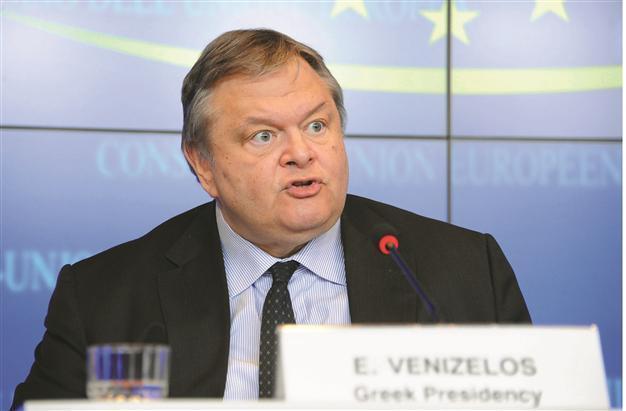Greece hopeful for fresh impetus in Turkey ties
Emine Kart ATHENS / ANKARA – Hürriyet Daily News

‘Greek-Turkish cooperation is a major attainment that must be safeguarded, because it is a stabilizing factor
for the whole region,’ Greek Foreign Minister tells the Hürriyet Daily News in an exclusive interview. AA photo
Turkey and Greece could “create fresh momentum for overcoming the chronic points of bilateral friction,” Greek Deputy Prime Minister and Foreign Minister Evangelos Venizelos has maintained, voicing confidence both for the future of bilateral relations and for the stabilizing role they could play for the whole region.
“At a time of uncertainty and regional instability in the Eastern Mediterranean, Greek-Turkish cooperation is a major attainment that must be safeguarded, because it is a stabilizing factor for the whole region,” Venizelos told the Hürriyet Daily News in an exclusive interview.
He also noted that Turkey and Greece, having held the second and latest gathering in March 2013, could hold the third meeting of their joint High Level Cooperation Council before the end of this year.
“I think it is positive that we have reached the point where, even if we disagree, we can discuss things in a civilized manner on all levels, while also looking at ways to upgrade our bilateral cooperation in all sectors - particularly in energy, trade, tourism, and investments. This turns a new page in relations between our two countries,” he said.
Still, when asked to assess Turkey’s approach to regional developments concerning the Arab Spring, Venizelos was less forthcoming.
“We believe it is in Turkey’s interest, as a candidate for accession to the EU, to continue dialogue with the EU and to intensify its efforts to harmonize its foreign policy with the EU Common Foreign and Security Policy. With regard to the matter of harmonization, a gradual reduction in the level of harmonization has been observed in recent years, since 2010. We have taken joint initiatives in the past, and we could take further initiatives in the future - in economic and energy cooperation, the strengthening of regional stability, the protection of borders, the combating of terrorism, and the management of humanitarian crises - given that we are facing the common challenges of our region,” he said.
With regard to the Turkey-Greece cooperation council, Venizelos told the Daily News that preparations should be made for the third meeting later this year.
“The meetings on the level of ministry officials, as well as my recent one-on-one meeting with Foreign Minister [Ahmet] Davutoğlu, on the margins of the NATO ministerial meeting, show precisely that the promotion of Greek-Turkish relations remains a priority for both the Greek and Turkish governments.
We hope that the third meeting of the Greek-Turkish High Level Cooperation Council can take place before the end of this year. Following a period of elections in Turkey, as well as in Greece – and after the successful completion of the Hellenic Presidency of the Council of the EU – we will have the time to make the necessary preparations, so that the Council can produce substantial results. I think the third meeting of this platform will be productive as long as we pursue new paths of practical cooperation and speed up the implementation of the agreements that have already been reached,” he said.
Elephants in the room: Cyprus, minority issuesAs talks continue for a diplomatic solution on Cyprus, Venizelos stressed that the Greek Cypriots were waiting for a “positive response” from the Turkish Cypriots to recent proposals.
“Our firm position is that an agreed, comprehensive, viable, functional and just solution can be reached based on the resolutions of the U.N. Security Council and the European acquis. In the present phase, we are awaiting an exchange of proposals from both sides on all the issues in the talks, as has been agreed on. We also think it would be positive if there was a favorable response from the Turkish Cypriot and Turkish sides to the very constructive proposals made by Cypiot President [Nicos] Anastasiades for the adoption of confidence-building measures, with the focus on the opening of Famagust,” he said.
He also emphasized the importance of Cyprus in Turkey’s EU accession process. “Of course, the implementation the long-awaited Additional Protocol to the Ankara Agreement, and the normalization of Turkey’s relations with the Republic of Cyprus, would impart significant momentum to Turkey’s European perspective. Greece continues to support systematically and sincerely this perspective, so long as Turkey meets its accession obligations,” Venizelos said.
He also linked the Cyprus solution to the question of minority rights on the island. “I would like to note that the implementation of the Additional Protocol, the normalization of Turkey’s relations with the Republic of Cyprus, compliance in practice with the principle of good neighborly relations, and respect for fundamental rights – including religious freedoms and minority rights – are prerequisites for the accession of every candidate country; prerequisites that all the member states have agreed on.
Consequently, they concern not only Greece and Cyprus, but the EU as a whole. The EU’s calls for the meeting of these terms and prerequisites should be taken as an opportunity for the promotion of democratic reforms and respect for human rights and fundamental freedoms, as well as for the practical manifestation of good neighborly relations,” he said.
“Respect for international law – and particularly for the Law of the Sea – and the achievement of a just and viable solution on the Cyprus issue, in accordance with the U.N. Security Council resolutions, could really change the regional state of affairs, making the Eastern Mediterranean a pole of regional stability that could contribute to European energy security. It would also bolster growth, create new jobs, and contribute to the promotion of regional cooperation,” Venizelos added.
